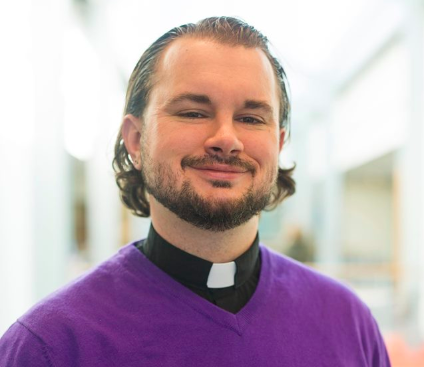Column by Rev. Drew Tucker, University Pastor
I’ve worked at Capital for over a year now. One incredible blessing is the diverse set of friends I’ve made in Capital Worship and Candlelight, Dinner & Dialogue as well as Interfaith Meditation. Yet, we’re a large community! Though I know many of you, I don’t know you all. Nor do all of you know me. Perhaps that’s intentional on your part! If so, this column probably isn’t for you.
Overtly, this column is about simplifying spirituality so that everyone can understand it. So many religious communities use insider language that can feel uncomfortable, if not rude, to outsiders, and it can be scary to become a part of conversation where you don’t know the acronyms and definitions that insiders think everyone must understand.
That’s sometimes a news flash for religious folks like me: not everyone understands the language we only seem to use in church, temple, mosque, or synagogue.
So this column intends to explain in plain language what those things mean. It means to give a simple introduction to theology for everybody, not just lifelong religious practitioners.
A second goal is to introduce myself to some of you whom I haven’t gotten to know as well yet, or perhaps not at all. You may not want or need a pastor right now. That’s fine and I honor your agency to make that decision.
Yet what I want you to know and hopefully learn through this column is that if you ever find yourself wanting or needing a pastor, or just someone to hash out some spiritual questions, I’m here for that.
I’m here for you.
What is a pastor, anyway?
A student asked me this recently. What does that word even mean?
It comes from the ancient Latin word for “shepherd.” Think about your friends from the country whose cows go out to pasture and whose dirt products get pasteurized for sale. Those words share a root with pastor.
Pastors are leaders of flocks and herds. Their goal, like a shepherd, is to make sure the community is fed good food and drinks cool water. Their hope, like a shepherd, is to protect the flock from predators and disease. Their heart, like a shepherd, is to know every individual in the group and to love the whole group as much as every individual.
Logistically, pastors in my tradition are psychiatrically evaluated, background checked, and theologically educated with a masters degree; in fact, if you believe my degree name, I’ve supposedly mastered divinity. That’s hardly the case, of course. Yet, the point is that we believe people deserve pastors who are academically trained, psychologically vetted, and meet some baseline of integrity.
In my tradition, the Evangelical Lutheran Church in America, pastors are ministers of Word and Sacrament. In other words, we’re charged with the written and spoken promises of God and the physical signs and symbols of God’s presence.
So we read and teach words of scripture and we preach words from sermons and we pray words from the hearts of those who suffer and we speak words of prophetic justice for those who have been marginalized or oppressed.
We feed people real food, bread and wine, because we believe those things bring God’s presence inside our very bodies in a new, different, and intimate way. We wash people we water because we believe, through that ritual, God’s spirit identifies us as divine children, loved and claimed as God’s family and commissioned as God’s reflections of love to the wider world.
From those central actions, pastors undertake all sorts of tasks.
Pastors offer counsel, perform house blessings, officiate at weddings, preside over funerals, curate worship experiences and, in these and many other, various ways, seek to connect people with God’s presence in their daily lives.
Perhaps most radically in a culture of condemnation, pastors announce God’s forgiveness to the guilty and God’s adoration for all people. Pastors declare God’s desire for transformation, for ourselves and for our culture, toward God’s equitable justice and abundant life for all creation.
So, that’s what a pastor is, and it is whom I hope to be for this campus. If you’ve got questions about religious words or activities you’d like me to write about, send me an email at dtucker@capital.edu.
